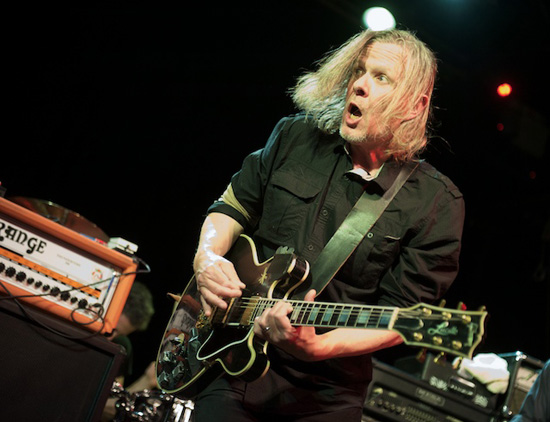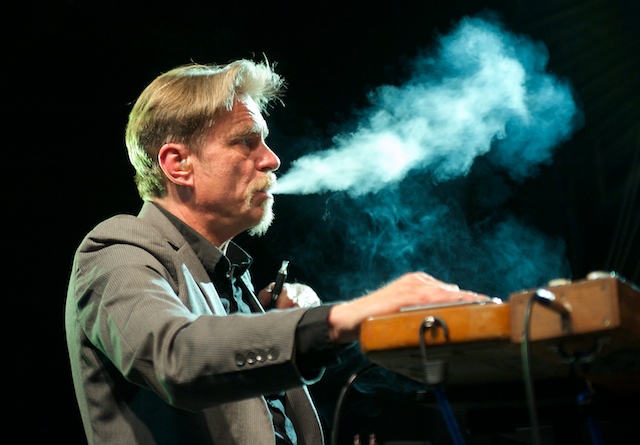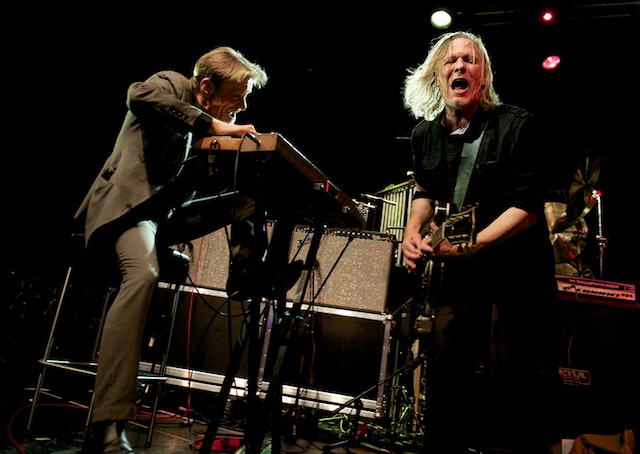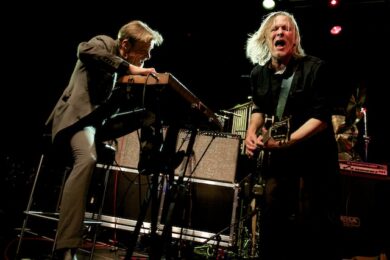In my mid-teens, I had Swans down as a byword for extremity without having ever heard them. Every week, the front matter of the NME would contain half-page ‘looking back’ feature, tellingly positioned adjacent to the new bands interview, in which a writer would pick an act, usually critically acclaimed but not publicly so, who would help the paper’s younger readership make sense of – build a historical narrative about – their obsessions du jour. This was before the NME‘s retrospective gaze became just another facet of rock heritage, so we’re not talking about the Stones or Neil Young. No, this was arguably the era in which the canon of record-collector rock became properly defined; if you strung the pieces together in a scrapbook it would look like the minutes of a brainstorming session for a Death In Vegas record. I remember reading about Suicide first in here, trying to figure out how an eleven-minute drone composition about a man killing his family would actually sound, about the proselytising and incendiary live dynamics of Nation Of Ulysses, about the incomputable enigma of Spiderland. My idealised auditory image of this music made it sensational, world-altering, and this was never more the case than in that of Swans.
It was the photo that struck first. In monochrome adjusted in such a way as to accentuate the wanness of the band members to a chtonic level, Michael Gira appears to be pushing his hand out of the frame, offering something, but somehow snatching it away at the same time, the gesture of the Narnian Ice Queen if the Narnian Ice Queen looked like a carnival worker on secondment from the Great Depression. Beside him, Jarboe grinned, you sensed, not at some bit of intra-group bonhomie but out of a welling malevolence. It felt as if you were looking into some other world: not a pleasant one, but the massive ontological voltage of the image meant you gave up the ordinary calculations of comfort. That was before the description of the music, even. This, we were told, arrested the catharsis of punk by taking its aggression and volume but evacuating its tempo, leaving the pain, rescinding the release. Gira’s lyrics consistently confronted limit experiences of cruelty, violence, isolation. At the time I think I was finding Joy Division a bit tame – I hard to wait until my twenties to tap back into their particular bleakness. Aged sixteen or so, and starting to fumble my way through existentialism and the Beats, Swans seemed like they were going to become my band.
Strangely, they never really did, although I listened to them occasionally, and I’ve been genuinely surprised by their re-emergence over the last couple of years. Tonight The Electric is rammed, claustrophobically so. Swans are at least in part famous for the confrontationalism of their live shows in the 80s where, apparently, Gira would order the air conditioning of venues to be turned off to replicate the experience of, say, a Sadean-cliché S&M dungeon. Tonight, though, is the pure masochism of the twenty-first century arts consumer. This discomfort doesn’t, sadly, fall into the logic or justification of radical aesthetics, but then you have to start asking questions about the very nature of a radical aesthetic based on discomfort when everyday life puts you in a permanent state of low-level anxiety. Indeed, what Swans were, in their 80s punk and No Wave heyday, has been caught up with, and surpassed in its abrasiveness, by mass culture. I’ve been listening a lot lately to Pitbull and Jennifer Lopez’s song for the World Cup, and it hurts. It’s pure aggression that does not need to be supplemented by a zero-tolerance approach to aircon or a GG Allin-style necro-gig. The sense of overload, which is deliberately conceived as an aesthetic strategy, on half the music you hear coming out of car windows or in the barbers makes the militant atonality of 1980s New York sound as quaint as Dion or Tommy Steele.

So what can Gira’s band mean on the other side of such an epistemic shift? Well, one thing that’s hard to deny is that they make sprawling, beautiful, immersive, thematically rich records which absolutely and definitively refuse passive listening. What Swans offer live is a form of intensity which is managed subtly so as to be a tribute performance to their own past, but with the maintenance of a certain prophylactic distance. They come on before their announced stage time and go into some weird hybrid of soundcheck and soundscape, which sounds quite lovely but still feels like a representation of what they’re supposed to be. This goes on for some time, and the main lights are kept on in order to create a Brechtian destabilisation of the boundaries between audience and performer. But they start playing soon after, and there’s a posedness which implies that they know that we know the rules, that this is a simulation of the prelude to radicality, rather than radicality itself.
They’re also very, very loud. Compared to the last show the typically Jurassic-sounding Melvins at the same venue this time last year, it’s loud. Compared to the My Bloody Valentine shows to tour Kevin Shields’ comeback album, it’s loud. This belies one of the great abiding strengths of Gira’s music: it is always unremittingly tactile, unignorably corporeal. The two percussionists have a set-up which occupies a space in the middle of the stage similar in size to a small house, and this assemblage of skin and metal is put to maximum effect in a propulsive one-two of Battle of Borodino drumming and chimes which slice through the upper registers like some primitive mode of execution. In fact, taken individually, every instrument sounds brilliant – in a way that is in fact reminiscent of the Bad Seeds. Part of growing old for Swans is the development of and adherence to musicianship, and to the engineering of sound, which far outweighs any concern about being taken for musos. This band care properly about what you hear.
However, it still feels over-structured as an ‘experience’. The set is long, pushing two hours in total, and composed largely of songs built around mechanical repetition. To an extent it’s hard not to feel that this is partly directed at people who want to go away and think ‘I just saw a band who played loudly and repetitively for three hours’. There’s duration, but not quite enough for this to replicate the challenge of durational art, and atonality, but not so much that we lose sight of the musical rule book. Maybe I’ve – and that original encounter with that picture of Swans is partly to blame for this – spent too much time thinking and writing about avant-garde aesthetics for too long, but I don’t come out of this performance with an itching desire to talk volubly with my friends in an attempt to get my head around what I’ve just been party to. By writing this I’ve opened the door to the ‘It’s only music, mate’ and ‘You just didn’t get it’ anticritical coalition, but it’s hard not to feel uneasy about the processes by which art becomes the experience of ‘doing art’. This is old ground, to a degree, and it might feel almost retro to have a debate about cultural capital, but it seems only honest to ask these questions of a band who, for all their recorded brilliance, seem an uncanny facsimile of the leftfield live.




